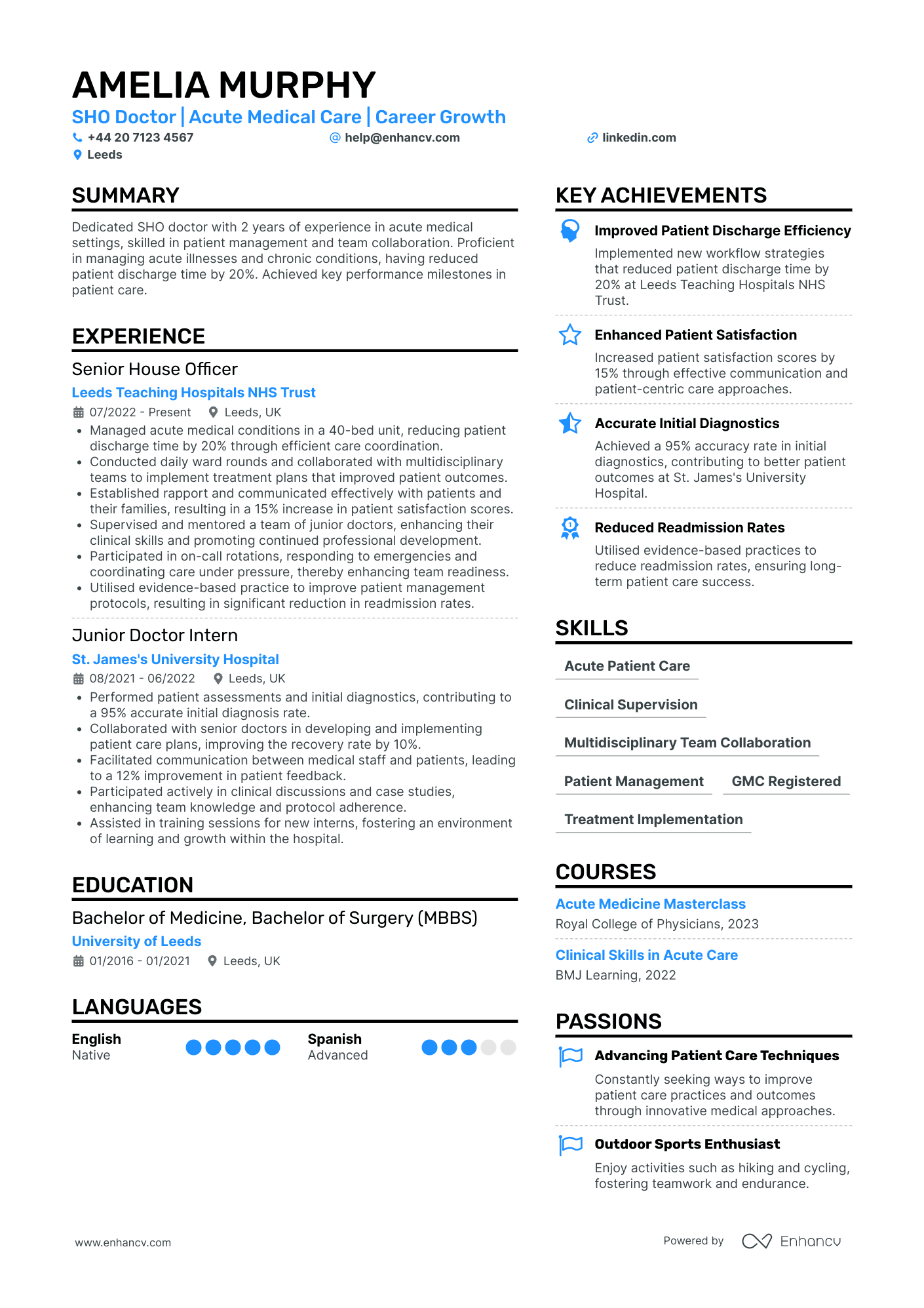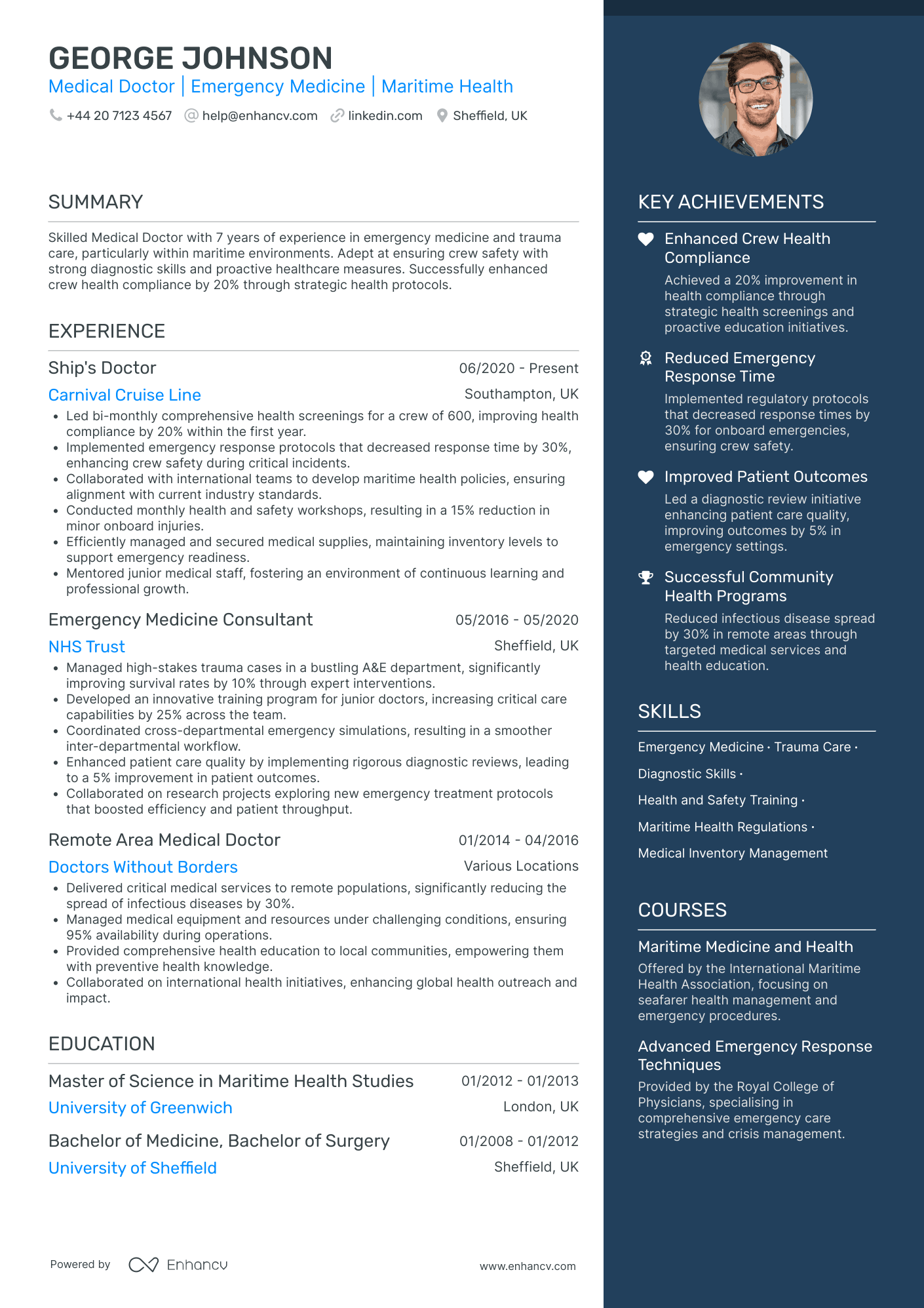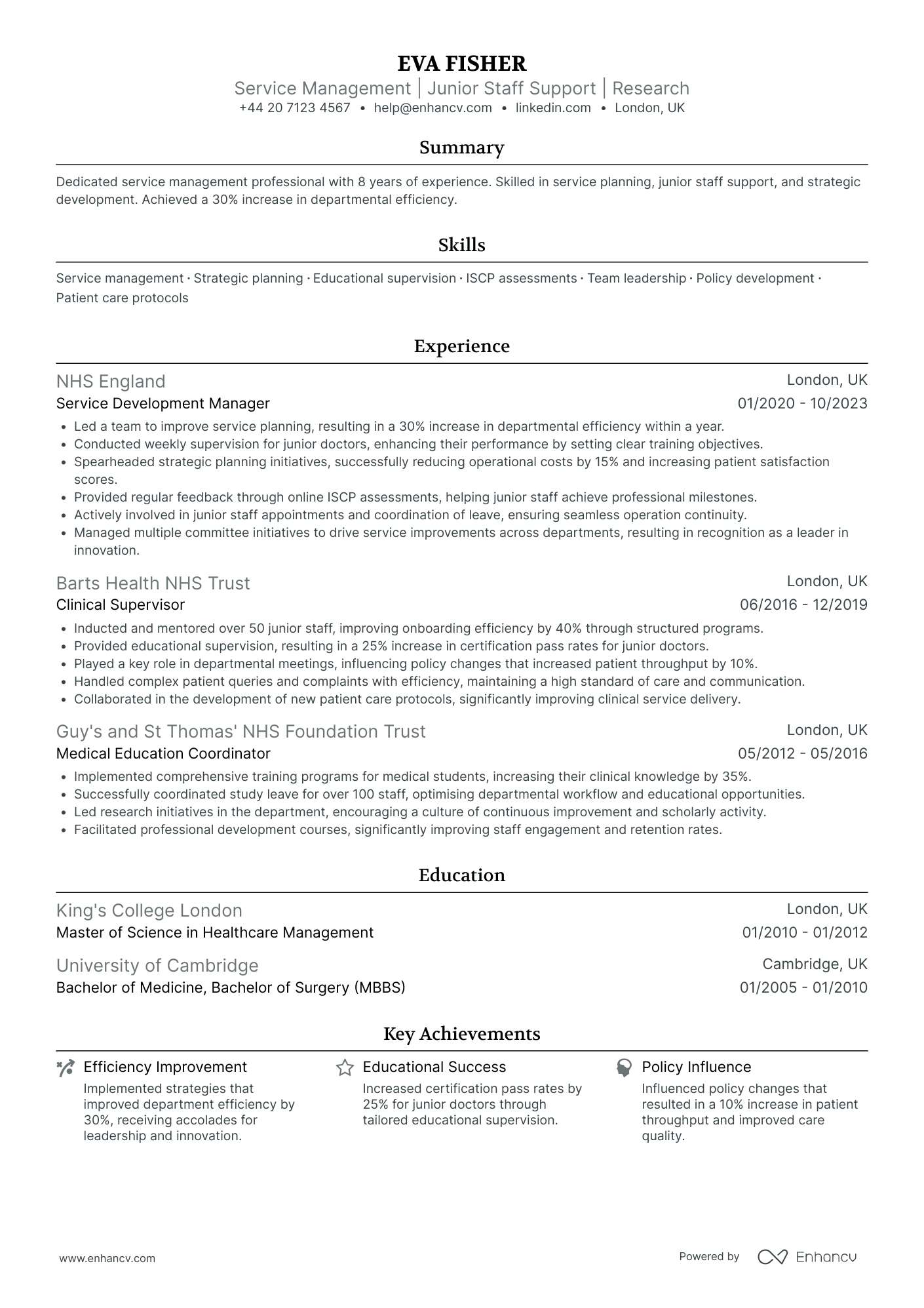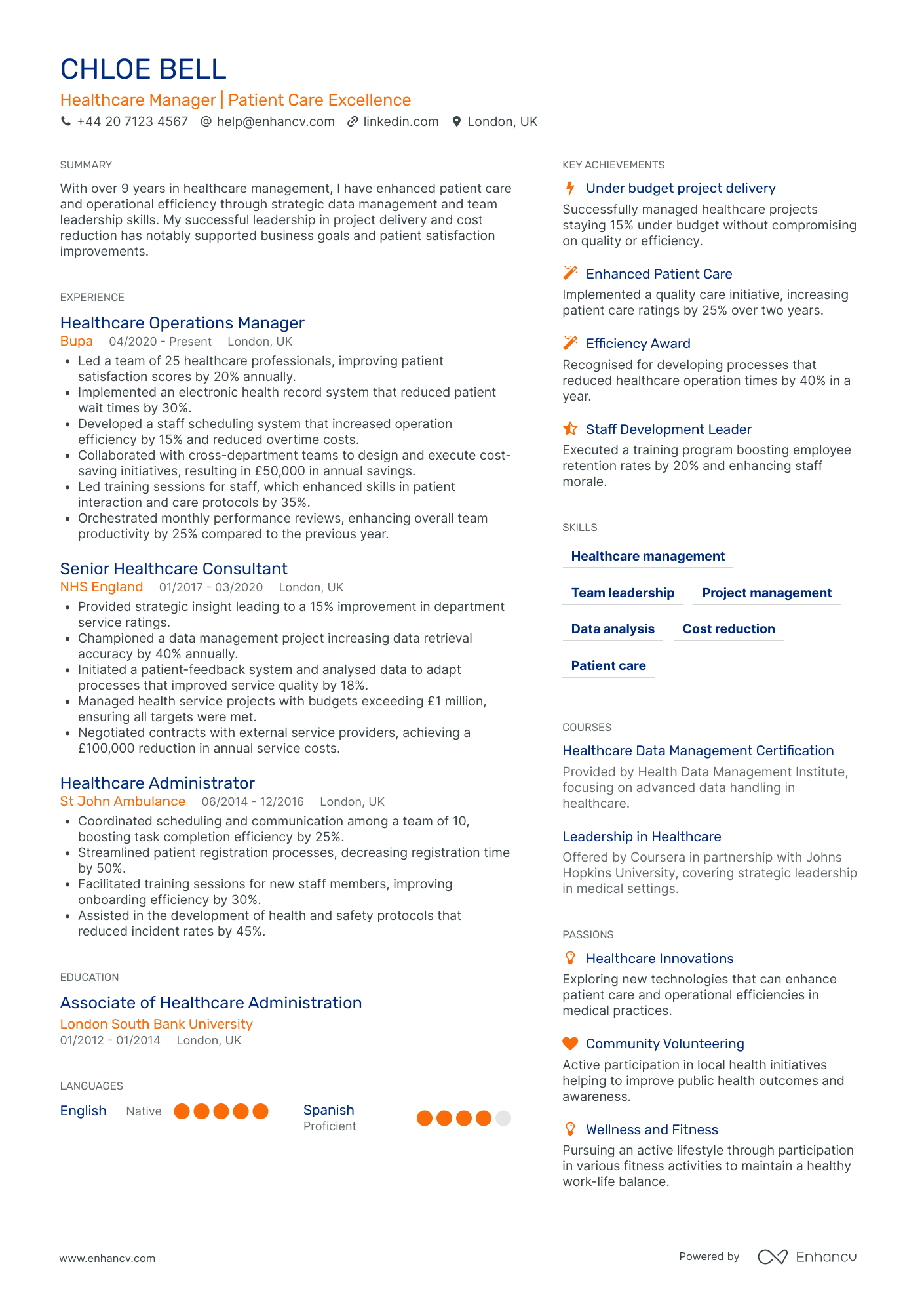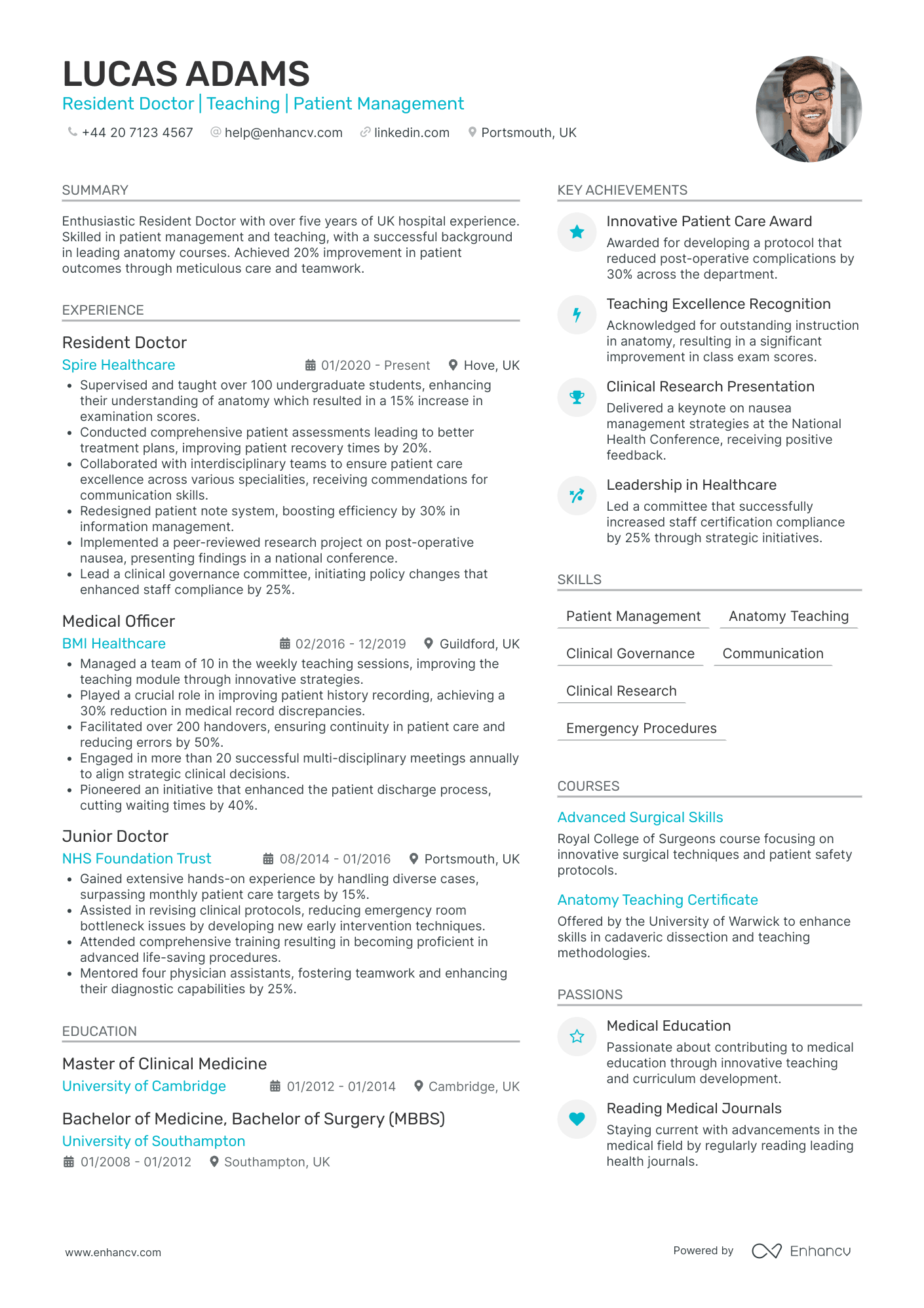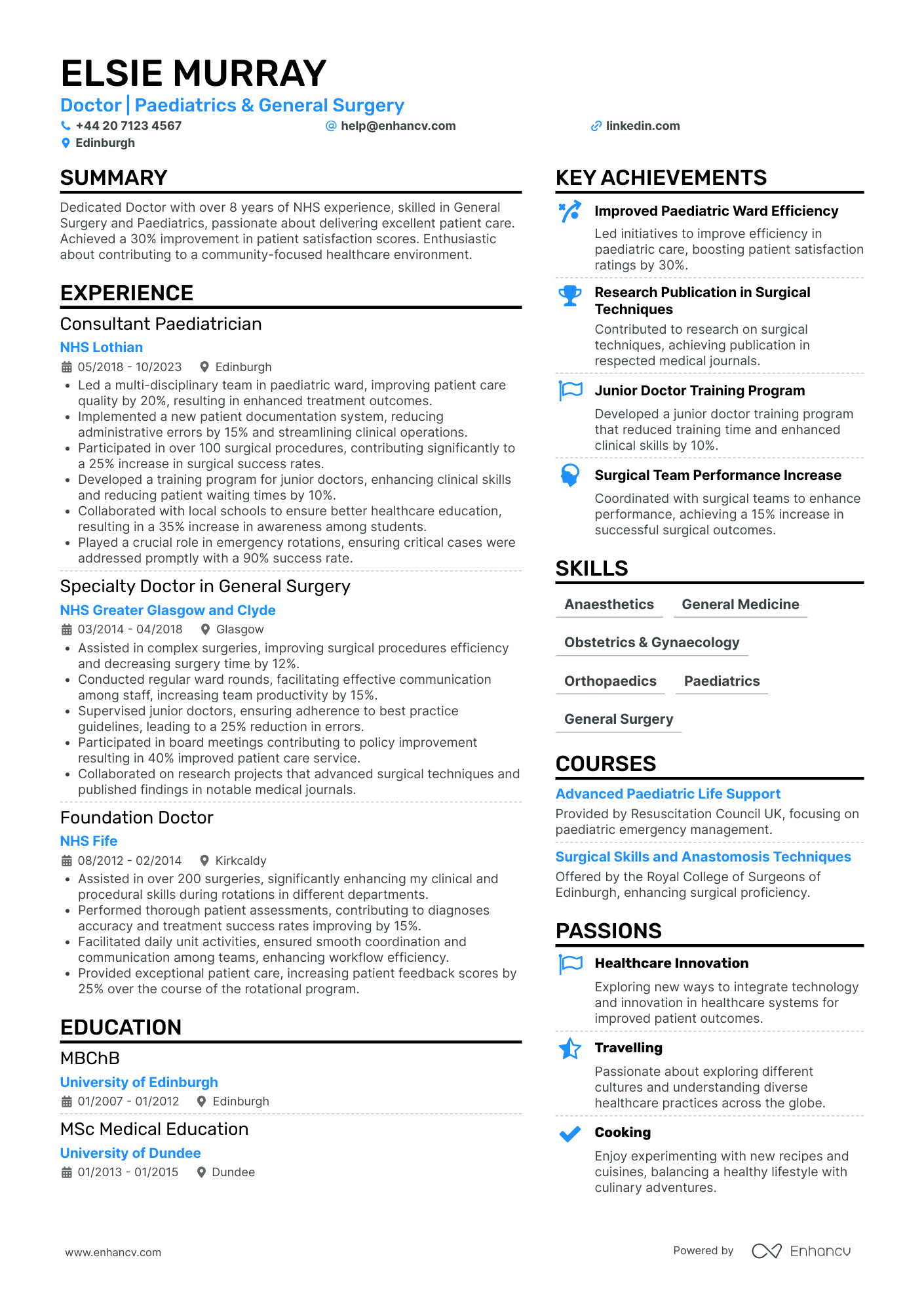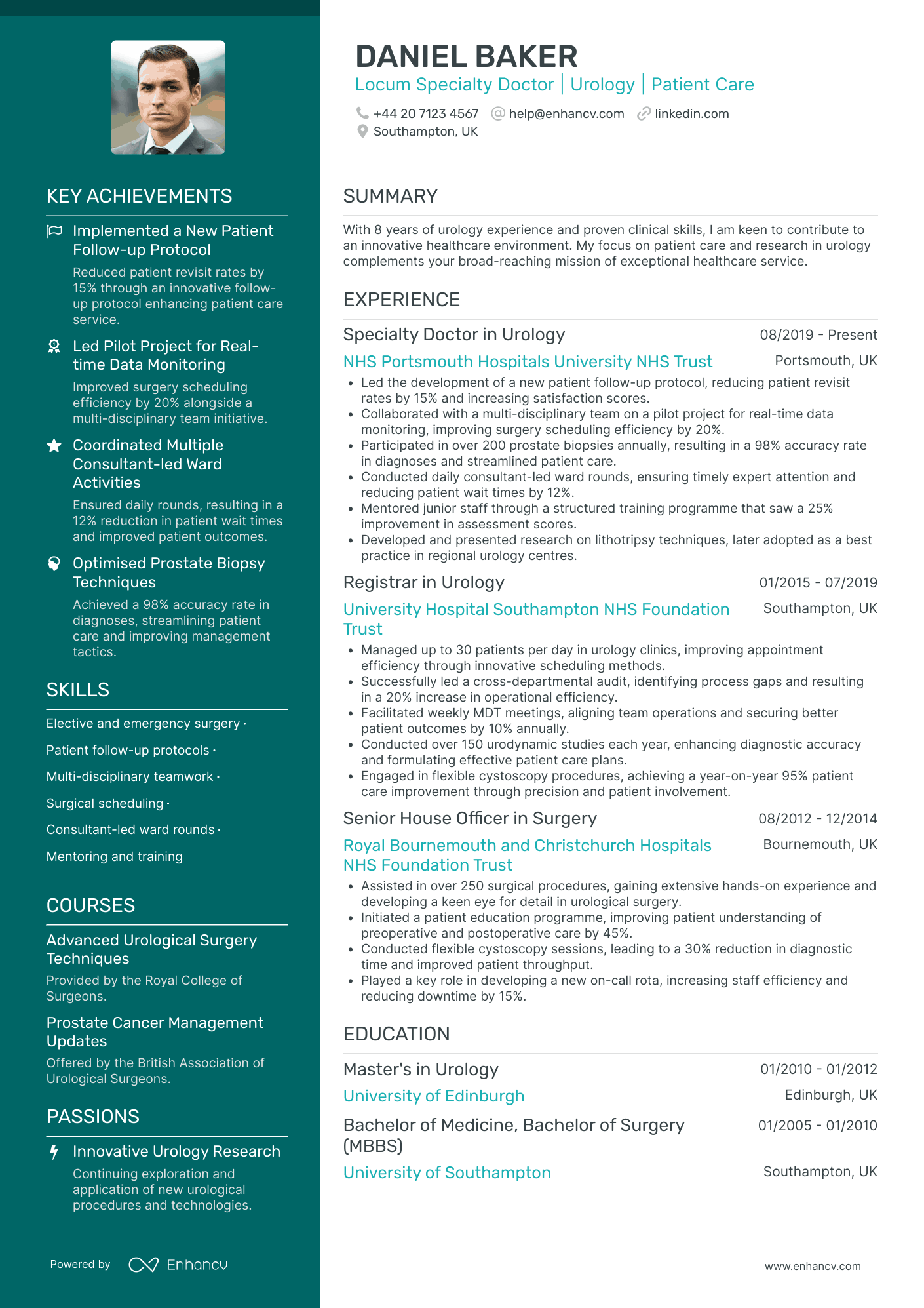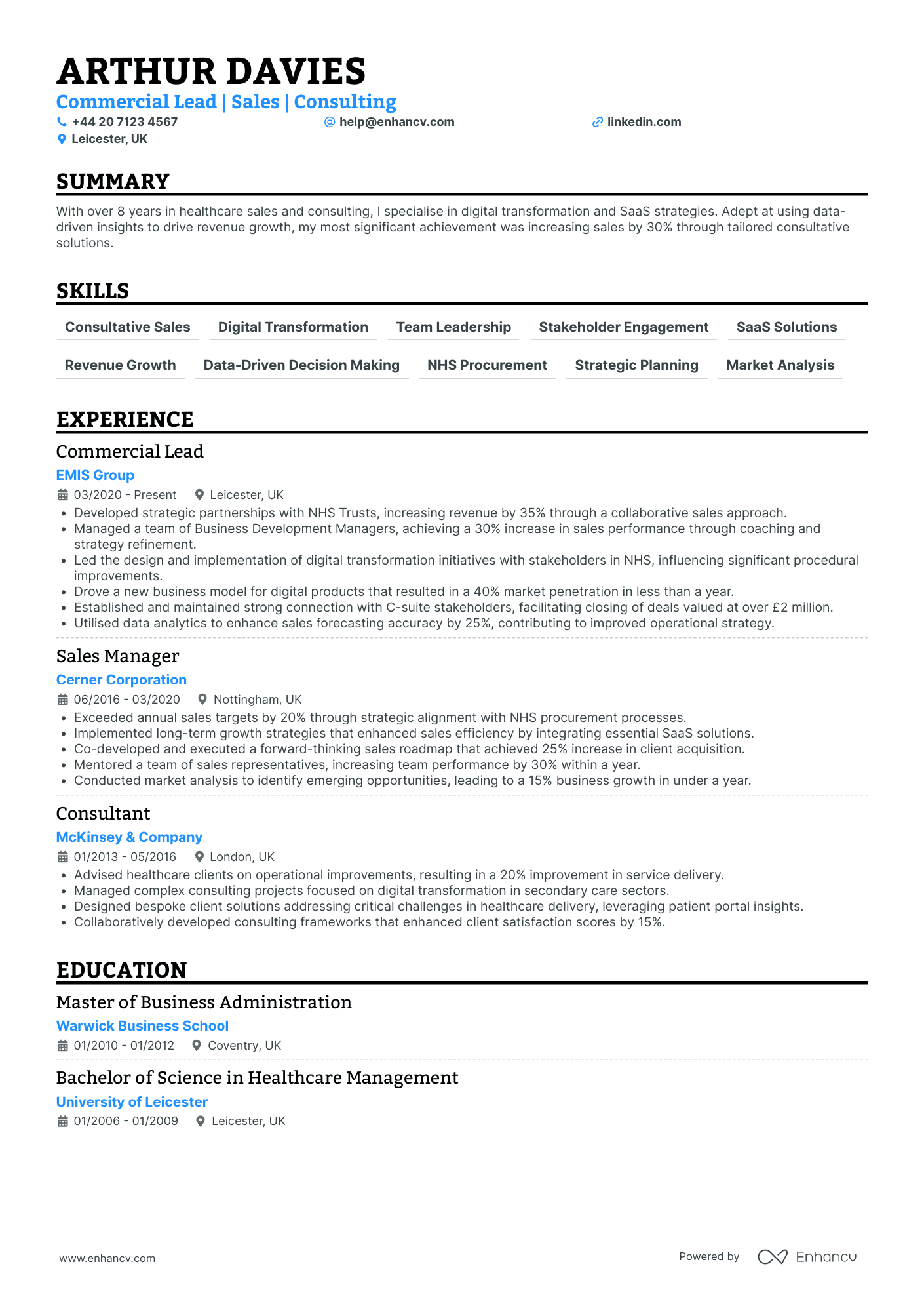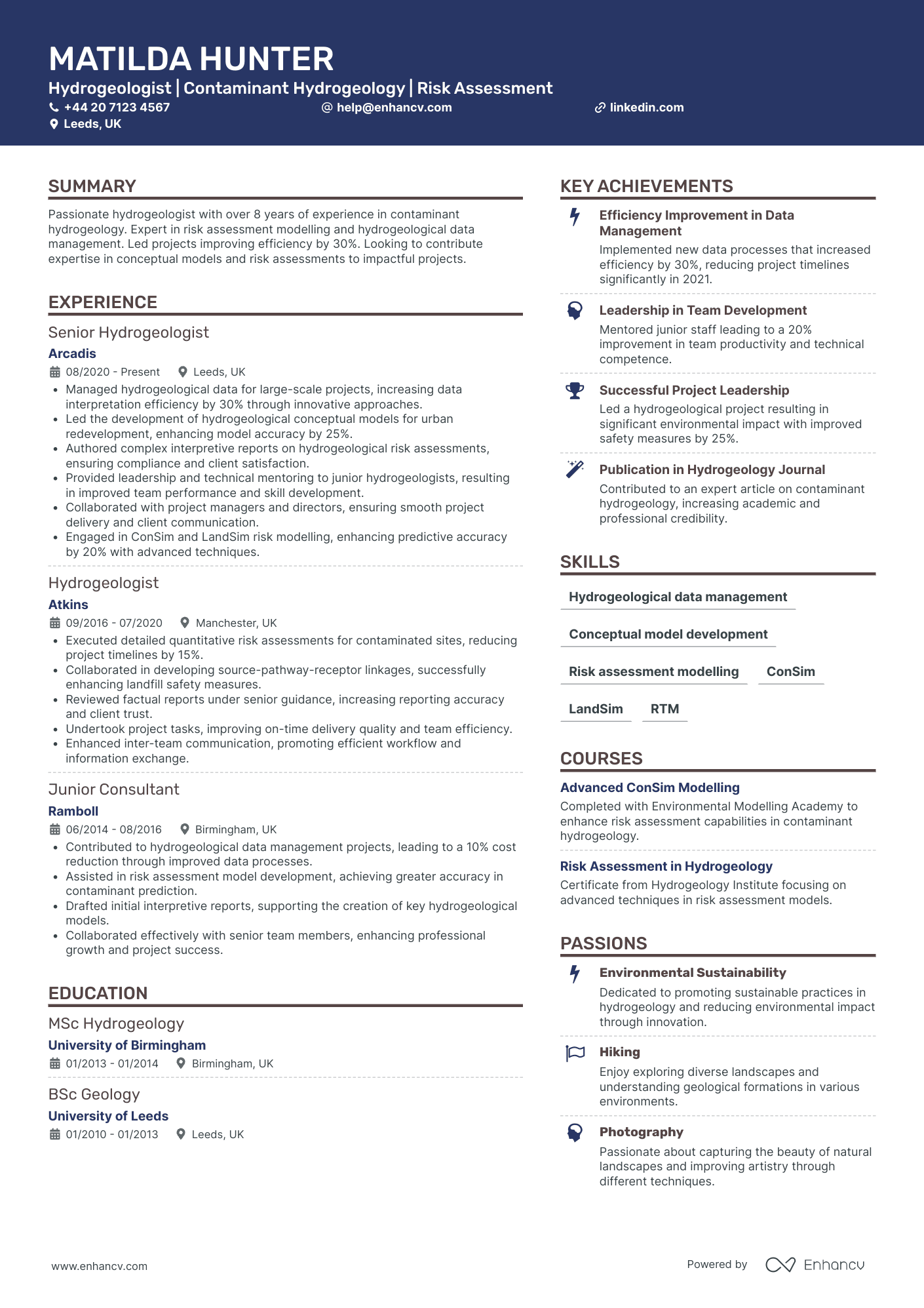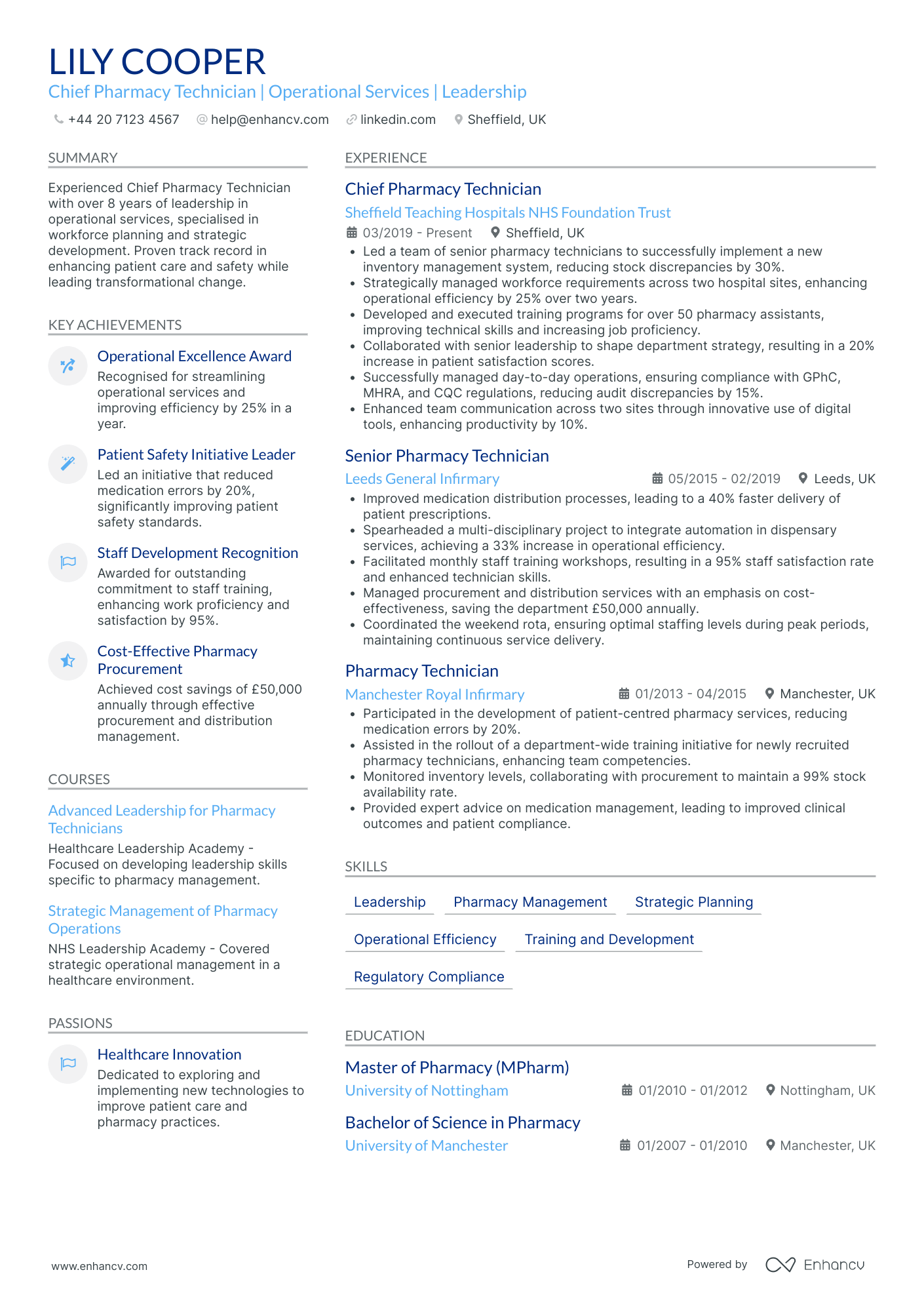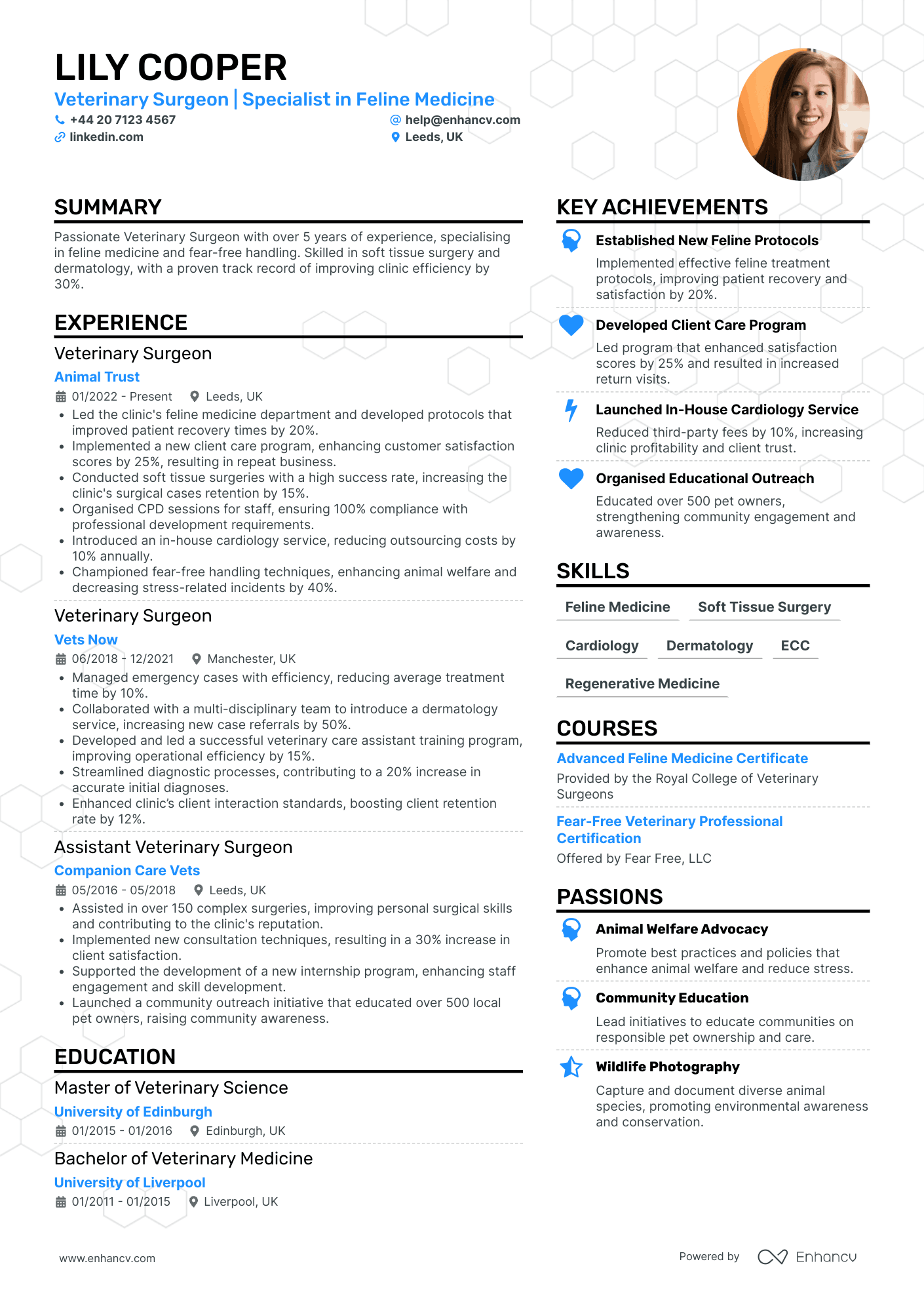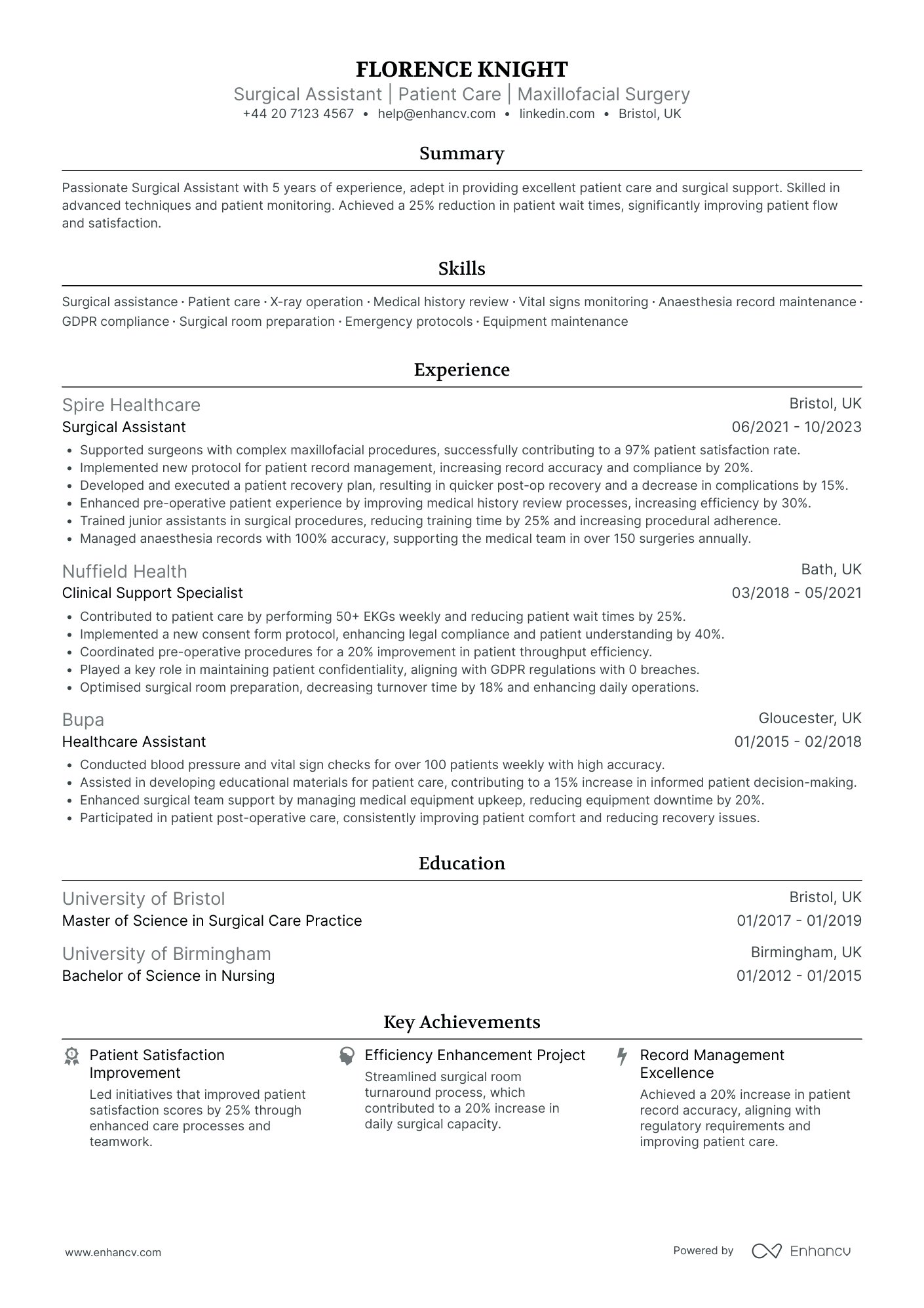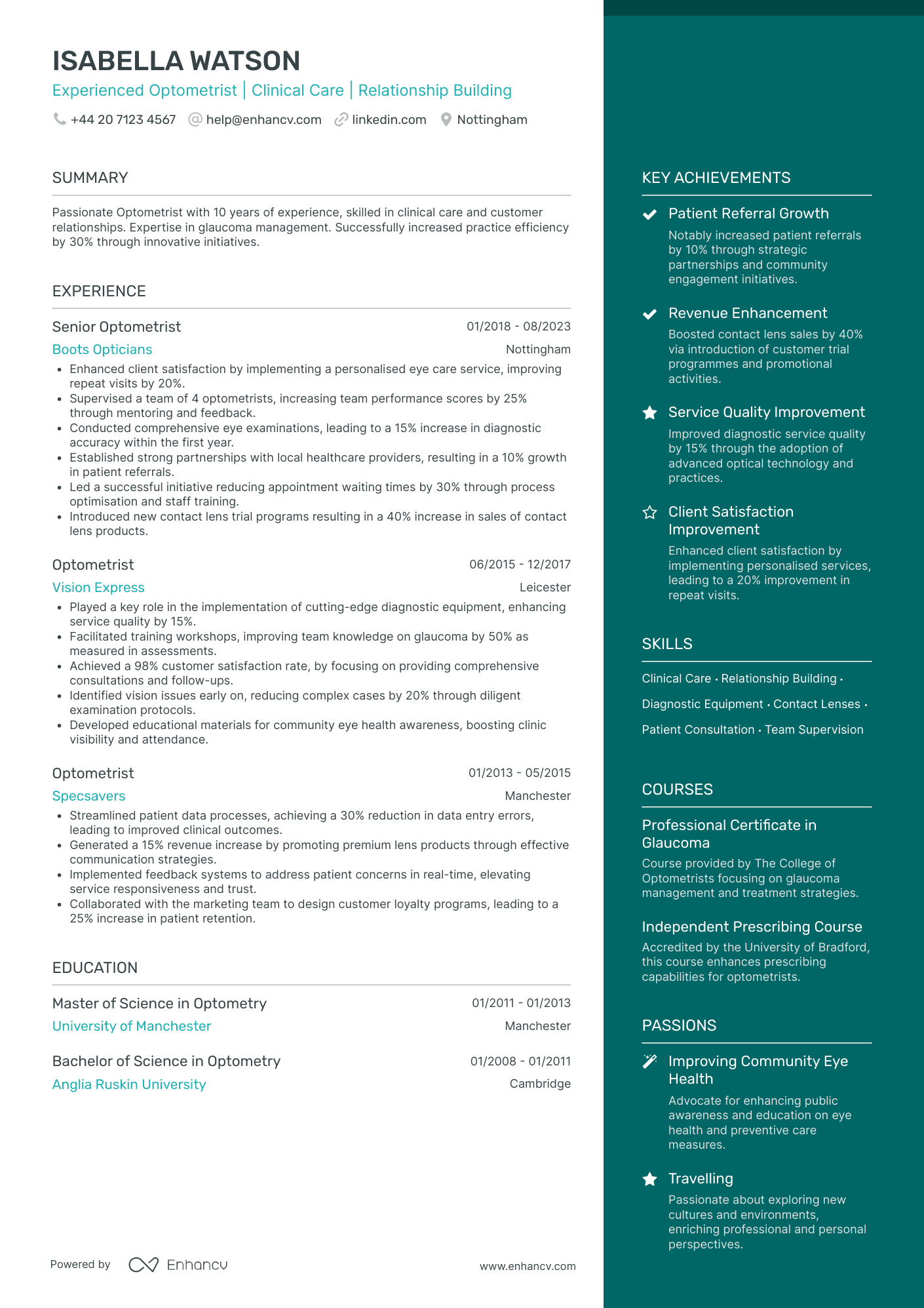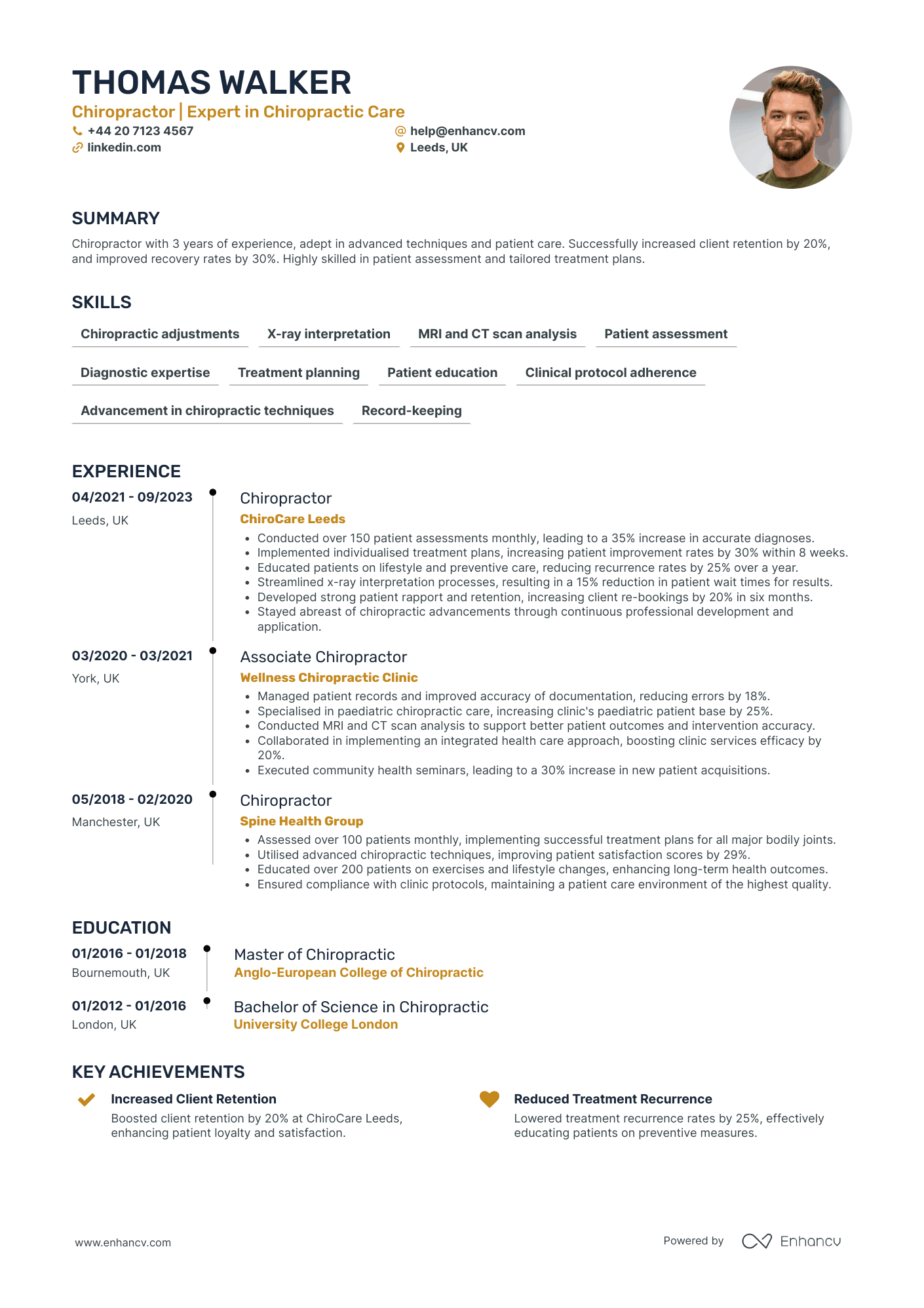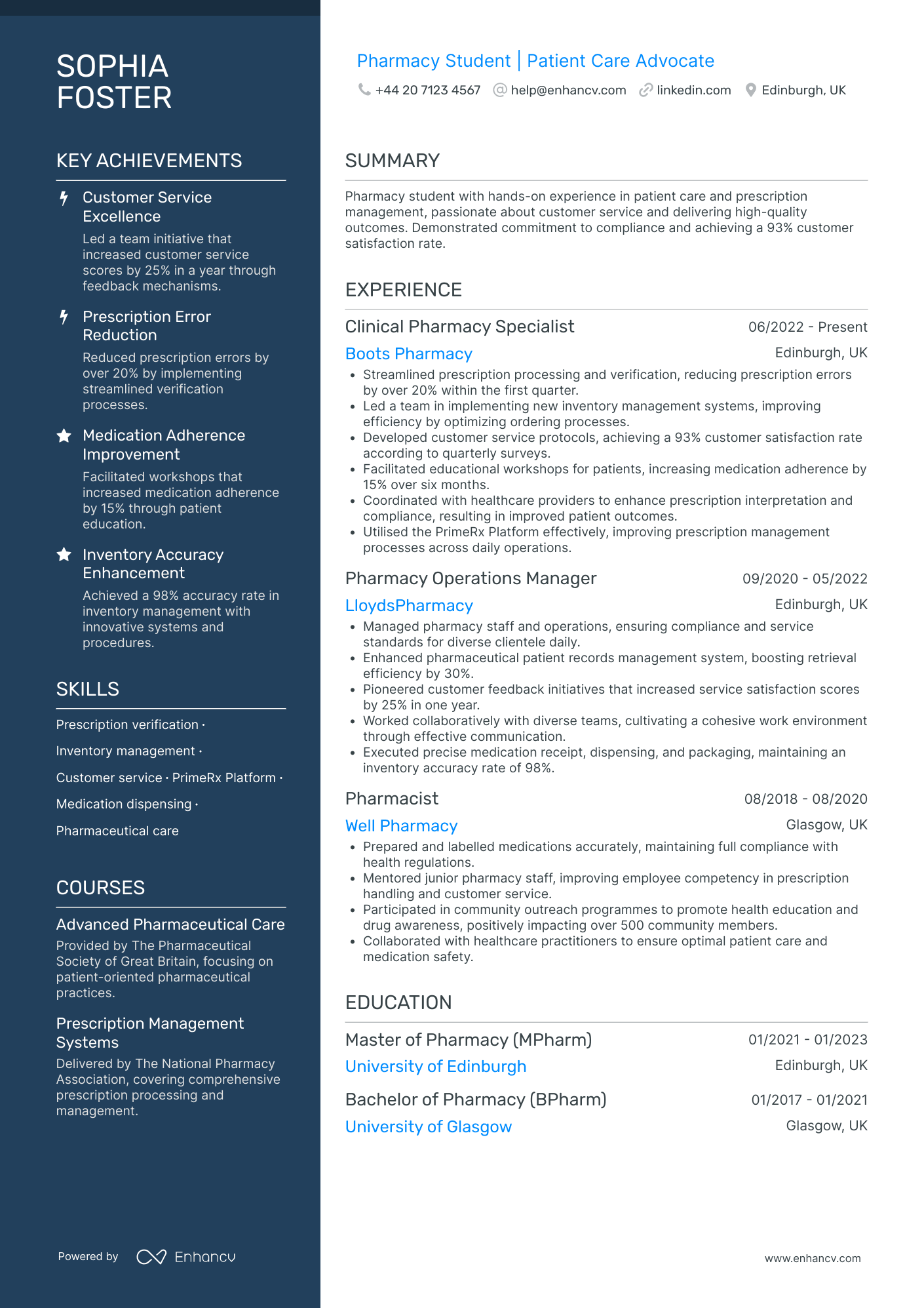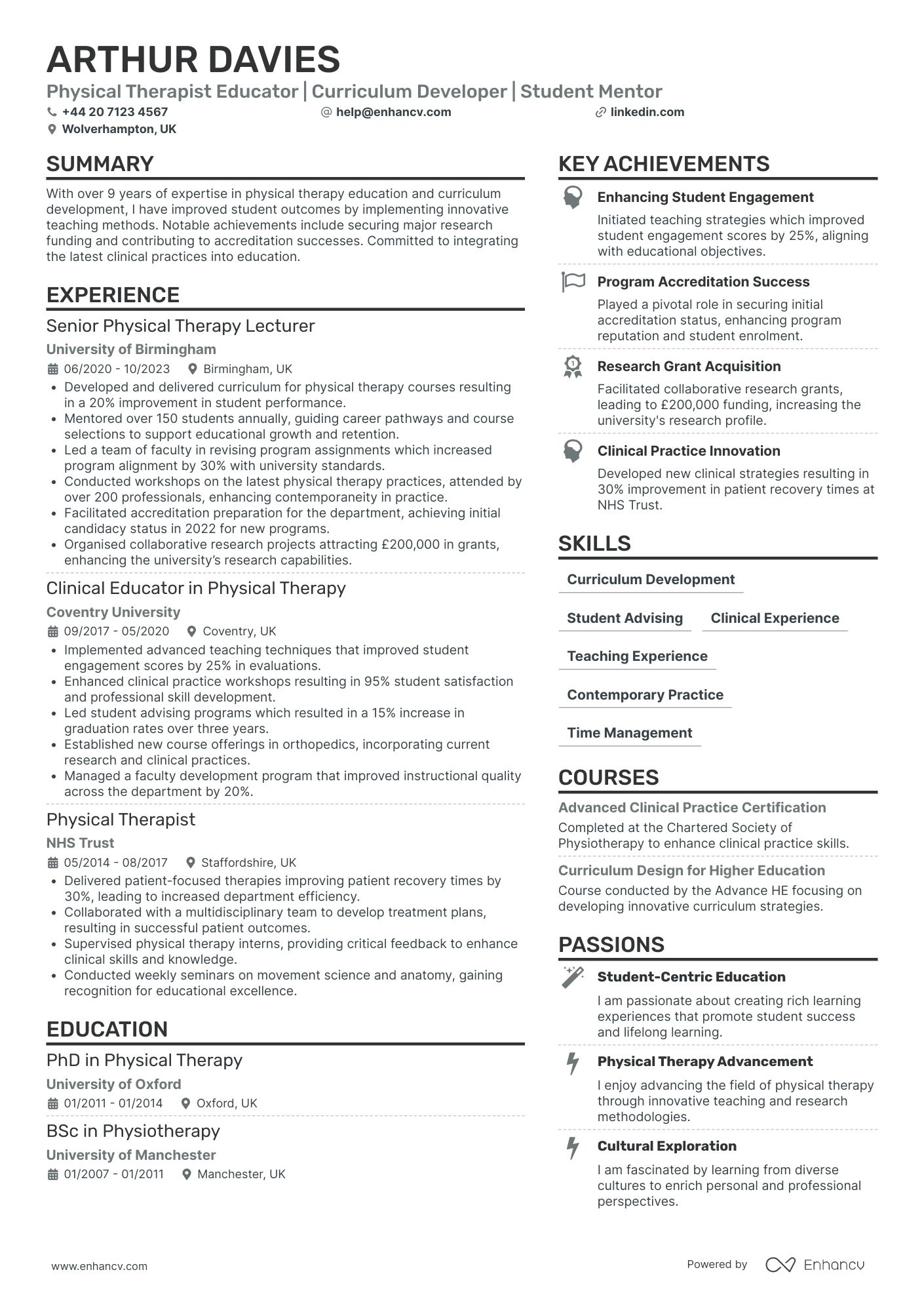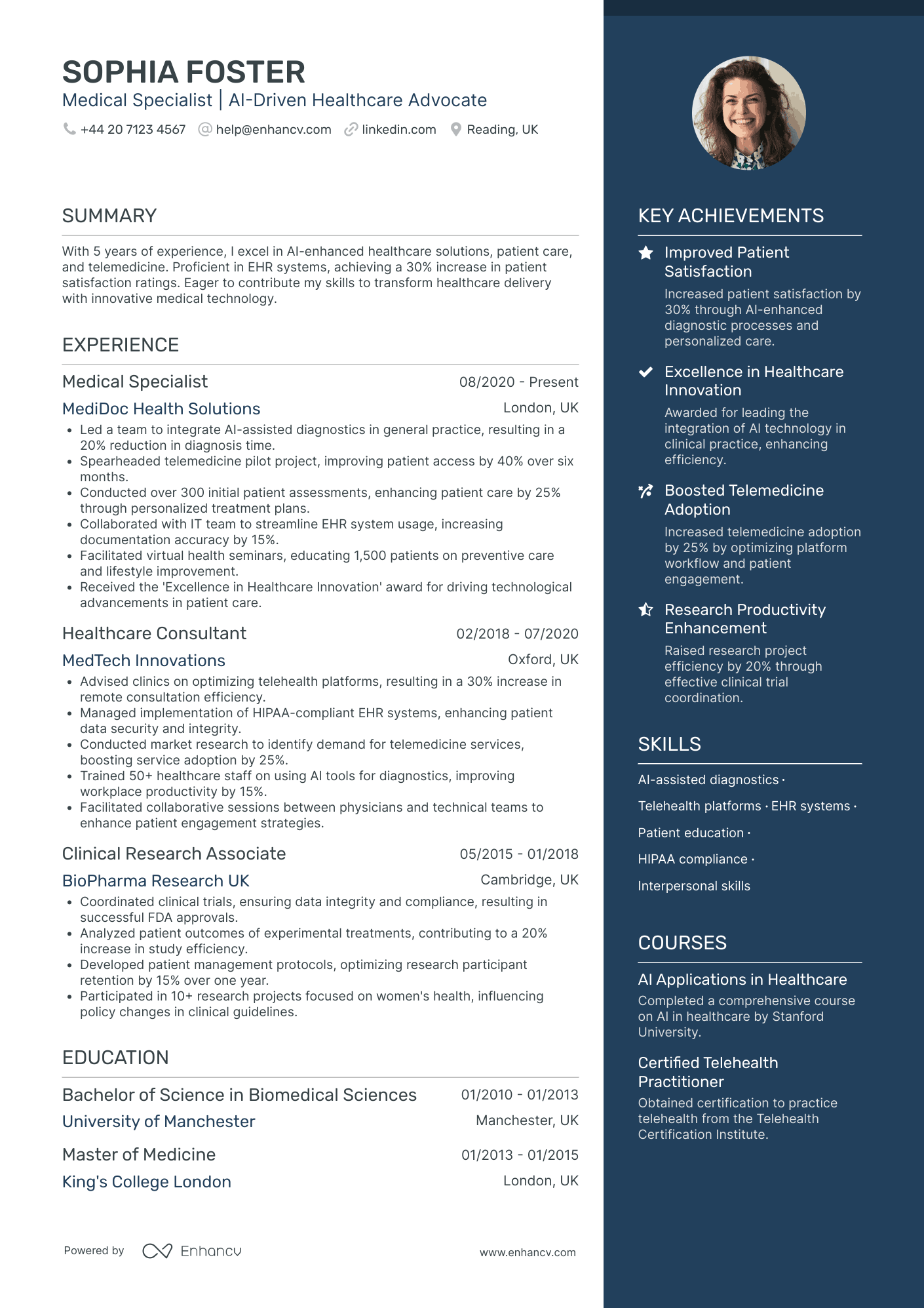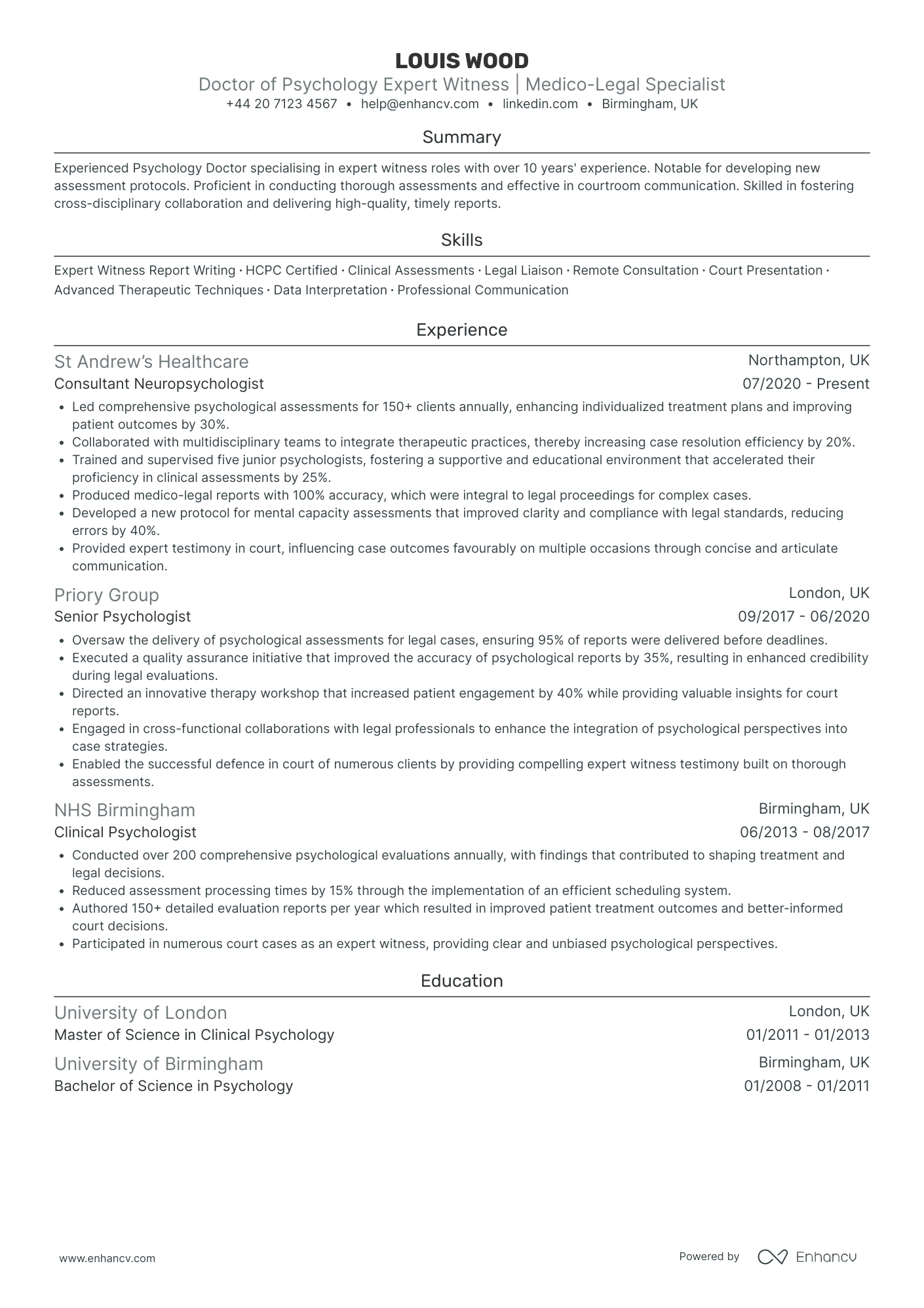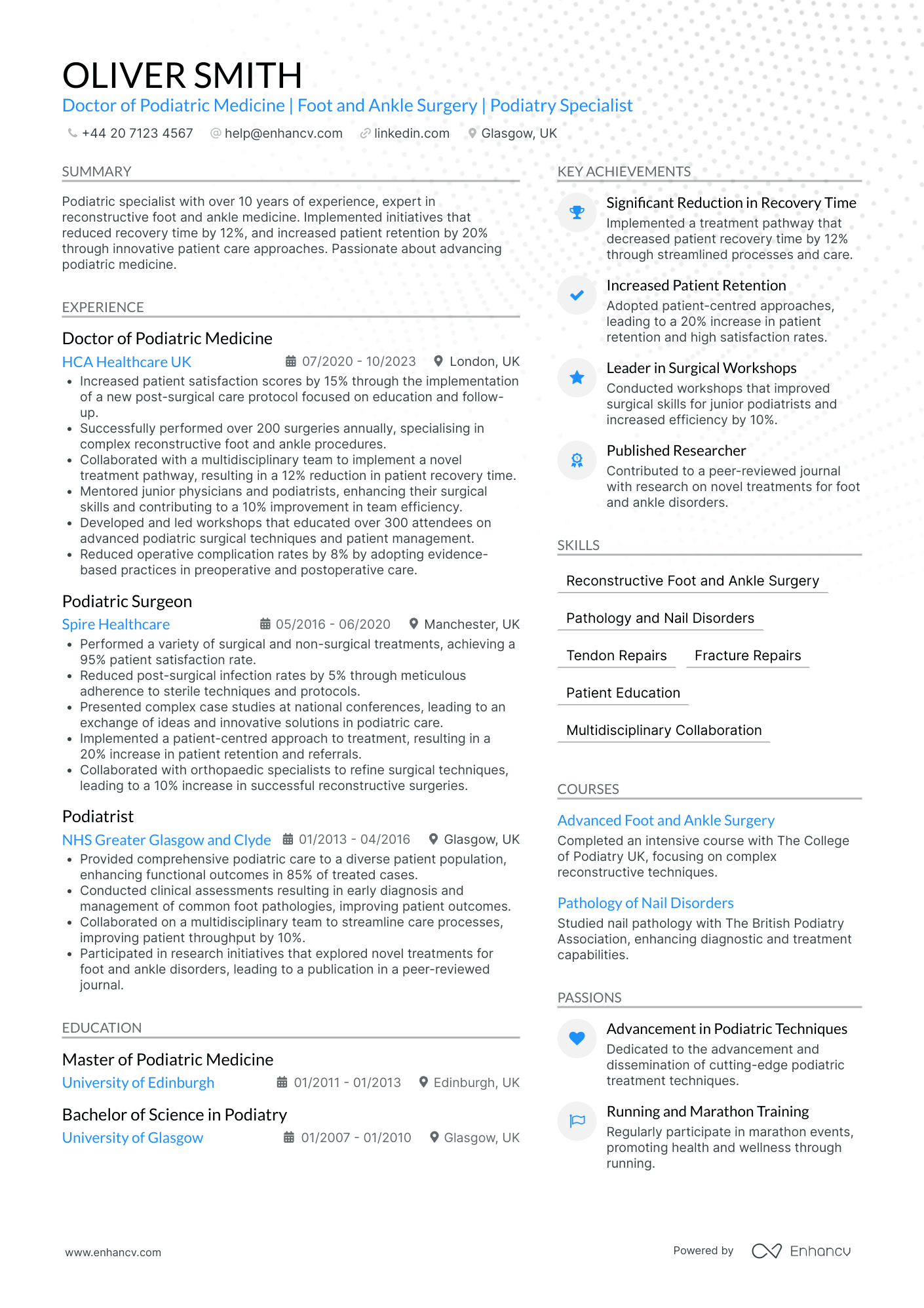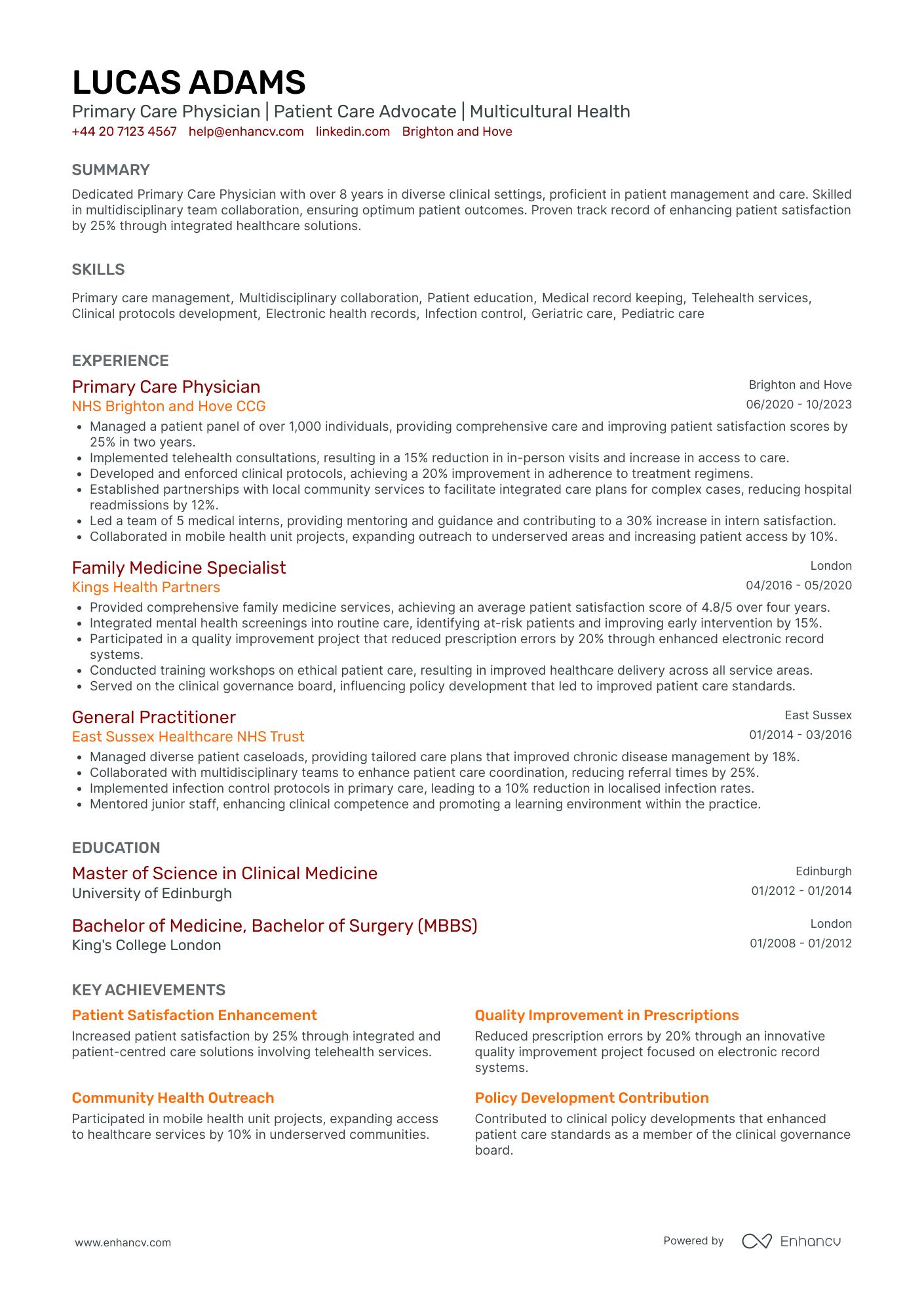Crafting a CV that effectively showcases your extensive medical experience and research prowess can be a daunting task. Our guide offers step-by-step instructions and expert tips to help you distil your expertise into a compelling narrative, ensuring you stand out in every job application.
- Applying best practices from real-world examples to ensure your profile always meets recruiters' expectations;
- What to include in your work experience section, apart from your past roles and responsibilities?
- Why are both hard and soft skills important for your application?
- How do you need to format your CV to pass the Applicant Tracker Software (ATS) assessment?
If you're writing your CV for a niche doctor role, make sure to get some inspiration from professionals:
Resume examples for doctor
By Experience
Junior Doctor
- Structured and Clear Presentation - The CV is expertly organized into sections that are easy to navigate, providing a clear overview of Amelia's qualifications, experiences, and education. Each section is concise yet informative, allowing potential employers to quickly identify key information about her acute medical care expertise.
- Achievements with Tangible Impact - Amelia's achievements, such as reducing patient discharge time by 20% and increasing patient satisfaction scores by 15%, are not just figures but reflect meaningful improvements in patient care and operational efficiency. These accomplishments demonstrate her ability to make a significant impact on healthcare outcomes.
- Adaptability and Cross-Functional Collaboration - With experience in both intern and senior roles, Amelia shows adaptability and a capacity to collaborate with diverse healthcare teams. Her experience in leading junior doctors and working with multidisciplinary teams highlights her ability to function effectively in various environments and under pressure.
Senior Doctor
- Well-structured and detailed content - The CV presents information in a clear and organized manner, with well-defined sections that cover all aspects of George Johnson's professional background. Each section is concise, yet thorough, ensuring that the reader easily grasps his qualifications and experiences relevant to maritime and emergency medicine roles.
- Significant career progression and specialization - George Johnson's career trajectory is marked by notable growth and specialization. Starting with a role delivering medical services in remote areas, he progressed to handling high-stakes trauma cases within the NHS, before specializing as a Ship’s Doctor for Carnival Cruise Line. This path highlights his dedication to evolving within the field and taking on increasingly complex responsibilities in emergency and maritime health.
- Industry-specific skills and protocols - The CV demonstrates profound knowledge in specialized areas such as maritime health regulations and medical inventory management. These industry-specific skills underline his capability to handle unique medical challenges at sea, illustrating his preparedness to ensure crew health and safety under maritime conditions.
Consultant Doctor
- Comprehensive Experience in Healthcare Management - Eva Fisher's CV showcases a robust career trajectory with significant experience in healthcare service management. Her leadership roles at NHS England and Barts Health NHS Trust illustrate a clear path of growth, with each position building on her expertise in strategic planning, junior staff support, and departmental efficiency improvements.
- Emphasis on Leadership and Mentorship - The CV highlights Eva's strong leadership abilities, particularly in guiding and mentoring junior staff. Her experience includes conducting weekly supervision sessions for junior doctors and improving onboarding efficiency, which underscores her capability to enhance team performance and productivity in demanding healthcare environments.
- Notable Achievements with Business Impact - The CV is rich with achievements that have tangible business relevance. Eva's initiatives in service planning led to a 30% increase in departmental efficiency and her strategic planning efforts resulted in operational cost reductions by 15%. These accomplishments not only demonstrate her effectiveness but also her contribution to organizational success.
Specialist Doctor
- Prominent Leadership and Management Skills - Chloe Bell's CV strongly emphasizes her ability to lead and manage teams effectively. Her role as Healthcare Operations Manager at Bupa is marked by spearheading a team of 25 healthcare professionals and implementing strategies that significantly improved patient satisfaction and operational efficiency. Her leadership prowess is further corroborated by achievements such as enhancing team productivity by 25% through performance reviews and orchestrating impactful training sessions.
- Data-Driven Approach and Strategic Vision - The CV distinctly outlines Chloe's commitment to leveraging data for strategic improvements, most notably during her tenure as a Senior Healthcare Consultant at NHS England. She successfully integrated a data management project that increased retrieval accuracy by 40% annually and initiated a patient feedback system to adapt and enhance service quality by 18%. These elements highlight her capability to use data analytics to inform decision-making and drive organizational excellence.
- Cross-Functional Experience and Industry Diversity - Chloe's diverse career trajectory is marked by her experience across different organizations and roles within the healthcare industry. She's demonstrated adaptability by transitioning from a Healthcare Administrator role at St John Ambulance to Senior Healthcare Consultant at NHS England, and later to Healthcare Operations Manager at Bupa. This varied background showcases her ability to work effectively across different functions and adapt to distinctive organizational cultures, enhancing her versatility as a healthcare manager.
Resident Doctor
- Clarity in Content Presentation - The CV is well-structured, with clearly defined sections that make it easy to navigate the candidate’s qualifications. It concisely conveys Lucas Adams' extensive medical experience, teaching expertise, and patient management skills, providing a comprehensive view of his professional history.
- Steady Career Growth - Lucas has demonstrated a strong upward trajectory, moving from a Junior Doctor to a Resident Doctor. This progression is indicative of his growing expertise and value within the healthcare sector, with increasing responsibility and influence in patient care and teaching.
- Innovative Patient Management Strategies - Unique methodologies are highlighted, such as implementing a research project on post-operative nausea and redesigning the patient note system. These initiatives reflect a focus on improving efficiency and patient outcomes, aligning with modern healthcare priorities of quality care and operational excellence.
Locum Doctor
- Well-structured and Clear Presentation - The CV is organized into distinct sections, including education, work experience, skills, and achievements, which facilitates easy navigation. Its logical flow ensures that each section builds upon the other, offering a coherent narrative of the candidate's journey in the medical field.
- Impressive Career Trajectory in Healthcare - Elsie Murray's career path shows significant growth, from a Foundation Doctor to a Consultant Paediatrician, indicating a steady climb in responsibilities and expertise. This progression highlights her capability in taking on more complex roles and leadership positions within the NHS.
- Integration of Leadership and Teaching Skills - The CV showcases Elsie’s ability to lead multi-disciplinary teams and develop training programs for junior doctors. These sections reflect not only her medical proficiency but also her commitment to mentoring and education, emphasizing her as a leader who enhances both individual and organizational performance.
Registrar Doctor
- Strategic Presentation of Skills and Achievements - The CV is meticulously structured to highlight the candidate's pivotal skills and achievements in a manner that underscores their strategic impact. Each position held includes clearly defined responsibilities and outcomes, such as improved surgery scheduling efficiency by 20% and a new patient follow-up protocol that reduced revisit rates by 15%. These elements illustrate the candidate's ability to drive meaningful improvements within healthcare settings.
- Progressive Career Path with Increasing Responsibilities - Daniel Baker's advancement from Senior House Officer to Specialty Doctor reflects a well-defined career trajectory marked by growth and an increase in responsibilities. This progression not only showcases his dedication to the field of urology but also emphasizes his readiness to handle more complex and leadership-oriented roles, as evidenced by his successful management of multi-disciplinary team projects and mentoring programs.
- Robust Focus on Innovative Urological Research and Techniques - An emphasis on technical depth is evident through the CV's focus on industry-specific contributions, such as developing and adopting new lithotripsy techniques and conducting advanced urodynamic studies. These high-level contributions are indicative of the candidate's commitment to the continued exploration and application of innovative urological practices, reinforcing his value within the specialty.
Lead Doctor
- Effective Content Presentation - The CV is structured clearly with sections that make it easy to navigate. Each section is concisely written, delivering relevant information without unnecessary details, which allows the reader to quickly grasp the candidate’s qualifications and experiences. This clarity in presentations indicates the candidate’s ability to communicate effectively and organize information, which are crucial skills in sales and consulting roles.
- Rich Career Trajectory in Healthcare - Arthur Davies’ career shows an impressive trajectory with consistent promotions, moving from a Consultant role at McKinsey & Company to his current position as Commercial Lead at EMIS Group. This growth signifies a deep understanding and mastery in the healthcare industry, specifically in digital transformation and SaaS, which are pivotal in the evolving healthcare market.
- Achievements and Impact on Business Growth - The CV highlights specific achievements, such as increasing market penetration by 40% and closing significant deals totaling over £2 million. These accomplishments not only demonstrate the candidate’s ability to meet and exceed targets but also reflect a profound impact on business growth and strategic development, particularly in aligning with NHS objectives and expanding digital product reach.
Principal Doctor
- Structured Clarity and Conciseness - The CV is well-organized, with clearly defined sections that make it easy to follow. Each section is concise yet informative, providing all necessary details without redundancy. This clarity helps convey the candidate’s message effectively, allowing the reader to easily navigate through her experiences, skills, and accomplishments.
- Consistent Career Growth and Expertise - Matilda's career trajectory shows a steady rise in responsibility and expertise within the field of hydrogeology. Her progression from Junior Consultant to Senior Hydrogeologist highlights her growing expertise and leadership abilities. This upward momentum is reinforced by her movement through reputable organizations, emphasizing her commitment to professional development.
- Extensive Use of Specialized Tools and Models - The CV demonstrates a deep familiarity with industry-specific tools such as ConSim and LandSim, highlighting her technical depth. Her expertise in employing these advanced risk assessment models and hydrogeological data management techniques underlines her capability to handle complex environmental projects effectively.
Chief Doctor
- Structured Presentation and Clarity - Lily Cooper's CV is presented in a well-structured manner, with clear headings and concise bullet points. This organization makes it easy to navigate and allows the reader to quickly understand her diverse skill set and extensive experience, particularly in pharmacy operations and leadership roles. The use of quantifiable results further enhances clarity and impact.
- Impressive Career Advancement and Commitment to Pharmacy - Lily’s career trajectory showcases significant growth from a Pharmacy Technician to a Chief Pharmacy Technician position over the span of her career. Her steady rise through the ranks is a testament to her dedication and competence in the pharmaceutical field, reflecting her skills in operational management and strategic leadership across different NHS Trusts.
- Impactful Achievements and Strategic Leadership - The CV emphasizes key achievements that underscore her ability to lead transformational changes within the pharmacy sector. For example, Lily's initiatives led to a 30% reduction in stock discrepancies and a 25% operational efficiency boost, indicating her strategic vision and effectiveness in improving both patient care and departmental performance.
By Role
Doctor of Veterinary Medicine
- Clear and Structured Content Presentation - The CV is well-organized and concise, starting with a strong header providing essential contact information followed by a brief yet comprehensive summary. Each section is distinct and strategically arranged, facilitating easy navigation through the candidate's qualifications, experience, and skills.
- Progressive Career Trajectory - Lily's career growth is evident, transitioning from an Assistant Veterinary Surgeon to leading roles in specialized areas such as feline medicine. Her move from a support role to taking charge of departments and initiatives indicates robust professional development and the ability to take on greater responsibilities.
- Industry-Specific Expertise and Techniques - The CV highlights Lily’s specialization in feline medicine and her application of fear-free handling techniques. Noteworthy is her contribution to the development of new medical protocols and the introduction of in-house services, showcasing her deep technical knowledge and ability to innovate within the veterinary field.
Doctor of Dental Surgery
- Structured and action-oriented presentation - The CV features a clearly organized structure, making it easy to navigate through the candidate’s qualifications, experience, and achievements. The use of concise bullet points succinctly highlights major contributions, allowing the reader to quickly grasp key information.
- Demonstrates a consistent career progression - Florence Knight's career trajectory illustrates a steady advancement from Healthcare Assistant to Surgical Assistant, with a focus on patient care in maxillofacial surgery. This growth reflects increasing responsibilities and expertise, showcasing a deepening specialization in surgical assistance.
- Emphasis on adaptability and cross-functional experience - The CV highlights Florence's ability to function across different roles within healthcare settings, from surgical assistance to clinical support, showcasing her adaptability. This versatility is vital in healthcare where conditions and needs can rapidly change, underlining her preparedness for various challenges.
Doctor of Optometry
- Emphasizes leadership in optometry - The CV showcases Isabella's strong leadership qualities, highlighting her role as a Senior Optometrist where she supervised a team of four optometrists. Her efforts in mentoring and providing feedback led to a notable 25% improvement in team performance scores, demonstrating her effectiveness as a leader.
- Integration of innovation and efficiency - Isabella's career history reveals a commitment to process optimisation and technology adoption, such as the implementation of new diagnostic equipment at Vision Express, which enhanced service quality by 15%. Additionally, her initiative to streamline patient data processes resulted in a 30% reduction in data entry errors while at Specsavers.
- Achievements with tangible business impact - The CV effectively details achievements that have significant business implications, including enhancing practice efficiency by 30%, increasing client satisfaction and repeat visits by 20%, and promoting growth through strategic partnerships, which increased patient referrals by 10%. These demonstrate Isabella's ability to contribute to both the clinical and business aspects of optometry practices.
Doctor of Chiropractic
- Structured and Clear Presentation - The CV is neatly organized with a logical sequence, making it easy to read and follow. Key information is presented clearly under defined sections such as Education, Experience, Skills, Achievements, and Passions, ensuring the candidate’s qualifications are readily apparent.
- Strong Career Progression and Professional Growth - Thomas Walker’s career trajectory is marked by a steady progression in roles from Associate Chiropractor to a fully-fledged Chiropractor, showcasing his growth and increased responsibilities within the field. His movement from different locations and clinics also reflects adaptability and broadening of professional horizons within chiropractic care.
- Industry-Specific Expertise and Advanced Techniques - The CV emphasizes Walker’s proficiency in specialized chiropractic techniques and tools, such as advanced joint mobilization and x-ray interpretation. His commitment to continuous professional development in areas like pregnancy and pediatric care underlines his dedication to evolving within his field, broadening his expertise and patient care capabilities.
Doctor of Pharmacy
- Content Presentation Excellence - The CV presents information clearly and succinctly, with each section well-structured and logically ordered. Bullet points are effectively used to break down responsibilities and achievements, making the document easy to read and the candidate’s contributions readily apparent.
- Significant Career Growth in Pharmacy - Sophia's career trajectory is marked by progressive responsibilities, from a Pharmacist to a Pharmacy Operations Manager and then to a Clinical Pharmacy Specialist. This growth within the pharmacy sector illustrates her ability to take on more complex roles and responsibilities over time.
- Industry-Specific Mastery and Tools - The CV highlights proficiency in industry-specific platforms like PrimeRx, and methodologies such as streamline verification processes and inventory management systems. These details demonstrate the candidate’s technical expertise and ability to leverage tools for improved operations.
Doctor of Physical Therapy
- Progressive Academic and Clinical Career Path - Arthur Davies' career showcases a robust growth trajectory in both academia and clinical practice. Starting as a Physical Therapist, he advanced into educational roles, becoming a Senior Lecturer, which highlights his progression from practical application to a more strategic, mentorship-centered position in the educational sector.
- Emphasis on Curriculum Development and Educational Leadership - The CV underscores Davies' unique industry-specific elements through his experience in curriculum development and educational leadership. His capabilities in designing cutting-edge courses and spearheading program modifications demonstrate his commitment to enhancing the academic landscape of physical therapy education.
- Significant Impact through Innovative Teaching and Research - The document effectively demonstrates Arthur's achievements that are relevant to business and educational outcomes. By improving student performance by 20% and securing £200,000 in research grants, his influence is shown not only through educational success but also through enhancement of the institution's research reputation and financial growth.
Doctor of Medicine
- Impressive Technical Expertise in AI-Driven Healthcare - The CV showcases the candidate's deep understanding of AI-enhanced healthcare solutions, EHR systems, and telehealth platforms. The inclusion of industry-specific courses and certifications highlights ongoing commitment to mastering cutting-edge technologies, setting them apart in a rapidly evolving field.
- Demonstrates Significant Leadership and Initiative - Throughout the candidate's career, significant leadership roles are evident, as shown in their ability to spearhead projects, collaborate with cross-functional teams, and educate peers through virtual health seminars. These experiences underscore their capacity to lead transformative changes in healthcare practices.
- Focuses on Business Impact and Patient-Centric Achievements - The CV not only lists achievements through impressive metrics but also emphasizes their broader impact, such as improving patient satisfaction and access, ensuring data security, and enhancing research productivity. This business relevance makes their profile very compelling for roles that prioritize patient outcomes and operational efficiencies.
Doctor of Psychology
- Cohesive Structure with Strategic Sections - The CV's structure is methodically designed to offer an immediate understanding of the candidate's qualifications and experiences. Each section seamlessly transitions into the next, beginning with a succinct summary and progressing through detailed professional experience, educational background, and specialized certifications. This deliberate presentation ensures clarity and ease of navigation for any reader.
- Diverse Career Evolution with Specialized Focus - Louis Wood's career trajectory showcases a clear progression from a Clinical Psychologist to a Consultant Neuropsychologist, reflecting both vertical growth and specialization within the field of psychology. The roles undertaken depict a commitment to both clinical practice and legal expertise, underscoring an impressive adaptability in integrating psychological insights into the legal domain.
- Impactful Achievements with Real-World Influence - The CV highlights significant achievements with a focus on their practical impact, such as developing an assessment protocol that improved clarity and compliance, reducing errors by 40%. These accomplishments are not just numerical but demonstrate a tangible enhancement in processes, leading to improved patient outcomes and more reliable medico-legal evaluations.
Doctor of Podiatric Medicine
- Strategic Career Progression - Oliver Smith's CV illustrates a clear upward trajectory in the field of podiatric medicine. Starting as a Podiatrist and advancing to a Doctor of Podiatric Medicine, his career path highlights a commitment to specialization and expertise in foot and ankle surgery, reflecting both growth and increasing responsibility across respected healthcare institutions.
- Effective Communication and Leadership - The CV highlights Oliver's dedication to mentoring junior physicians and facilitating workshops. These experiences emphasize his leadership skills and ability to foster team efficiency and professional growth, alongside a continuous effort to share knowledge within the podiatry community.
- Outcome-focused Achievements - Oliver's accomplishments are significant not only for their measurable impacts—such as a 12% reduction in patient recovery time and a 95% patient satisfaction rate—but also for their broader relevance to healthcare improvements. These results demonstrate his ability to implement effective strategies that enhance patient care and operational efficiency in a clinical setting.
Doctor of Osteopathic Medicine
- Structured Career Progression and Recognition - Lucas Adams' career trajectory demonstrates clear growth within the healthcare industry, with an evident transition to leadership roles. From managing diverse patient caseloads as a General Practitioner to leading medical interns as a Primary Care Physician, each position builds upon his capacity for increased responsibility and recognition in clinical governance. This progression showcases his capability to adapt and excel in various healthcare environments.
- Commitment to Community Health Improvement - The CV distinguishes itself by emphasizing Lucas' dedication to multicultural health and community health initiatives. His role in mobile health unit projects highlights his proactive approach to expanding healthcare access to underserved areas. This dedication not only improves patient outreach by 10% but also showcases his impact on local health equity, a crucial aspect for a physician focused on diversified patient care.
- Adaptability Through Innovative Solutions - Lucas’ CV illustrates a strong adaptability to current healthcare trends, notably through the implementation of telehealth consultations. By integrating telemedicine within his practice, he reduced in-person visits by 15%, marking a significant enhancement in operational efficiency and patient access. This innovation reflects a forward-thinking approach essential for adapting to the evolving demands of patient care.
How to ensure your profile stands out with your doctor CV format
It's sort of a Catch 22. You want your doctor CV to stand out amongst a pile of candidate profiles, yet you don't want it to be too over the top that it's unreadable. Where is the perfect balance between your CV format simple, while using it to shift the focus to what matters most. That is - your expertise. When creating your doctor CV:
- list your experience in the reverse chronological order - starting with your latest roles;
- include a header with your professional contact information and - optionally - your photograph;
- organise vital and relevant CV sections - e.g. your experience, skills, summary/ objective, education - closer to the top;
- use no more than two pages to illustrate your professional expertise;
- format your information using plenty of white space and standard (2.54 cm) margins, with colours to accent key information.
Once you've completed your information, export your doctor CV in PDF, as this format is more likely to stay intact when read by the Applicant Tracker System or the ATS. A few words of advice about the ATS - or the software used to assess your profile:
- Generic fonts, e.g. Arial and Times New Roman, are ATS-compliant, yet many candidates stick with these safe choices. Ensure your CV stands out by using a more modern, and simple, fonts like Lato, Exo 2, Volkhov;
- All serif and sans-serif fonts are ATS-friendly. Avoid the likes of fancy decorative or script typography, as this may render your information to be illegible;
- Both single- and double-column formatted CVs could be assessed by the ATS;
- Integrating simple infographics, icons, and charts across your CV won't hurt your chances during the ATS assessment.
PRO TIP
Use bold or italics sparingly to draw attention to key points, such as job titles, company names, or significant achievements. Overusing these formatting options can dilute their impact.
The top sections on a doctor CV
- Professional summary to highlight medical expertise and achievements, providing a snapshot of the doctor's qualifications.
- Medical education and training details to establish the doctor's foundational knowledge and specialised skills.
- Clinical experience and employment history to showcase the doctor's practical application of medical knowledge and patient care.
- Research and publications to demonstrate the doctor's contribution to medical knowledge and evidence of academic engagement.
- Licences and certifications to confirm the doctor's legal and professional qualifications to practice medicine.
What recruiters value on your CV:
- Highlight your specific medical qualifications, including your MBBS, MD, or any other postgraduate specialisms you have obtained. Ensure these are at the forefront of your CV to immediately showcase your professional status.
- Detail your clinical experience, specifying the hospitals, clinics, or medical institutions where you have worked, including the duration and the nature of your roles there. This gives potential employers an insight into your hands-on experience and areas of expertise.
- Include any publications or research you have contributed to, emphasising your role in the work and the impact it has had on the medical community. This demonstrates your commitment to advancing your field and your ability to contribute to evidence-based practice.
- Outline your professional memberships and affiliations with medical bodies such as the GMC, BMA, or specialty-specific colleges, indicating any active roles or responsibilities you have held within these organisations. This signals to employers your dedication to professional development and your recognition by the medical community.
- Provide evidence of your commitment to continuing professional development by listing attended conferences, additional courses, or certifications you have acquired throughout your career. It is crucial to show that you remain up-to-date with the latest medical advancements and training.
Recommended reads:
Making a good first impression with your doctor CV header
Your typical CV header consists of Your typical CV header consists of contact details and a headline. Make sure to list your professional phone number, email address, and a link to your professional portfolio (or, alternatively, your LinkedIn profile). When writing your CV headline , ensure it's:
- tailored to the job you're applying for;
- highlights your unique value as a professional;
- concise, yet matches relevant job ad keywords.
You can, for examples, list your current job title or a particular skill as part of your headline. Now, if you decide on including your photo in your CV header, ensure it's a professional one, rather than one from your graduation or night out. You may happen to have plenty more questions on how to make best the use of your CV headline. We'll help you with some real-world examples, below.
Examples of good CV headlines for doctor:
Dr. Charlotte Smith Consultant Radiologist | Magnetic Resonance Imaging Specialist | FRCR | 10+ Years of Clinical Experience
Dr. Aarav Patel Lead Cardiologist | Interventional Procedures Expert | MD, PhD | 15 Years in Cardiac Care
Dr. Emily Nguyen Paediatric Neurologist | Epilepsy & Developmental Disorders Focus | Board-Certified | 8 Years Post-Residency
Dr. Michael O'Brien Clinical Director of Oncology | Cancer Research Advocate | FRCP | 20+ Years of Dedicated Service
Dr. Sophia Chang Senior Anaesthetist | Pain Management Innovator | FFARCSI | Over a Decade in Anaesthesia
Dr. Lucas Garcia Head of Orthopaedic Surgery | Joint Replacement Specialist | FRCS (Orth) | 12 Years Surgical Expertise
Choosing your opening statement: a doctor CV summary or objective
At the top one third of your CV, you have the chance to make a more personable impression on recruiters by selecting between:
- Summary - or those three to five sentences that you use to show your greatest achievements. Use the CV summary if you happen to have plenty of relevant experience and wish to highlight your greatest successes;
- Objective - provides you with up to five sentences to state your professional aims and mission in the company you're applying for
CV summaries for a doctor job:
- With 12 years of surgical experience enriched by a consistent track record at the reputed St. George's Hospital, London, this Consultant Orthopedic Surgeon specializes in sports-related injuries, evidenced by successfully performing over 1,000 arthroscopic procedures and fostering advancements in minimally invasive surgical techniques.
- Accomplished General Practitioner from Manchester with over 15 years in family medicine, holding a Master's in Public Health, adept in managing chronic conditions and a proven leader in spearheading public health campaigns that reduced incidence of diabetes in the local community by 20% within two years.
- Former senior nurse with a decade of frontline experience in critical care, aspiring to transition into a medical doctor role post medical schooling, bringing comprehensive patient care skills, a deep understanding of clinical protocols, and a compassionate approach honed from years of providing exceptional nursing care.
- Biochemist with 5 years of pharmaceutical research experience at GlaxoSmithKline, transitioning into clinical practice to apply robust scientific knowledge in a direct patient-care setting, after successful completion of medical qualifications and clinical rotations focusing on internal medicine and pharmacotherapeutics.
- Seeking to embark on a medical career where my recent graduation from Imperial College London’s medical program and fresh knowledge of cutting-edge medical techniques can contribute to providing top-tier patient care and support the hospital’s commitment to health excellence.
- Eager to apply the rigour of my aerospace engineering background and problem-solving talents to the medical field, determined to leverage my technical expertise and intense training to excel in a challenging and dynamic medical environment, bringing zero years of direct medical experience but unparalleled dedication to human health and welfare.
How to meet job requirements with your doctor CV experience
We've now reached the essence of your actual CV - your experience section. This is the space where you can list your career roles and on-the-job successes. Many candidates tend to underestimate just how much time and effort they should put into writing this CV section. Your experience shouldn't be a random list of your responsibilities, but instead:
- Match the job description with your skills, values, and accomplishments;
- Start each bullet with a strong action verb, followed up with one key skill and your outcome of applying this skill;
- Spotlight parts of your career history that are relevant to the job you're applying for.
Before we move on, make sure to check out some professional CV experience sections.
Best practices for your CV's work experience section
- Detail clinical experiences by specifying the type and size of the healthcare settings you have worked in, such as hospitals, clinics, or medical centres.
- Highlight your duties and responsibilities in patient care, such as diagnoses, treatment plans, and follow-ups to showcase your clinical competence.
- Include any areas of specialisation or particular medical interests to demonstrate your expertise and focus within the medical field.
- Mention leadership roles and responsibilities, such as managing a department or leading a team of medical professionals, to show your capability in overseeing others.
- Document your experience with different types of patient populations, including age ranges and particular health concerns you've addressed, to show the breadth of your medical practice.
- Illustrate your commitment to professional development by listing any additional qualifications, courses, or conferences attended relevant to the field of medicine.
- Quantify your experience where possible, such as the number of patients seen per day or the success rates of certain procedures you have performed, for concrete evidence of your expertise.
- Emphasise your proficiency with medical technologies or EMR systems, indicating any specific software or equipment you are experienced with.
- Discuss any experience with interdisciplinary collaboration, indicating how you work with other healthcare professionals to provide holistic patient care.
- Directly managed a team of 5 junior physicians, improving department efficiency by 20% through targeted mentorship and workflow optimization.
- Spearheaded the implementation of a new electronic health record system, increasing patient data accessibility and reducing average documentation time by 30 minutes per patient.
- Launched a community health initiative that serviced over 2,000 local residents, improving early disease detection rates by 15% in the first year.
- Conducted clinical research on cardiovascular diseases, leading to a 5% improvement in treatment outcomes through the introduction of evidence-based practice adjustments.
- Delivered educational presentations at 10+ medical conferences, disseminating cutting-edge research findings to over 500 healthcare professionals.
- Collaborated with a multidisciplinary team to redesign patient care protocols, reducing hospital readmission rates by 8%.
- Pioneered a telemedicine program that increased access to care for rural patients by 25%, leading to higher patient satisfaction scores.
- Authored a clinical guideline on hypertension management adopted by the hospital network, influencing the treatment of an estimated 1,000 patients annually.
- Oversaw a budget of $2 million for departmental operations, optimizing resource allocation and cutting unnecessary expenses by 10%.
- Developed and implemented a new patient care model that led to a 12% improvement in the average patient healing time.
- Supervised the clinical training of 20 medical residents, enhancing the hospital's residency program's reputation and competitive positioning.
- Engaged in cross-functional collaboration to secure a $750,000 grant for medical research into innovative oncology treatments.
- Designed a public health outreach program that educated over 5,000 individuals on diabetes prevention and self-management.
- Orchestrated a partnership with local government to integrate mental health services into primary care, improving patient outcomes by 22%.
- Provided expert testimony on healthcare policy changes at state legislative hearings, advocating for patient-centered care improvements.
- Leveraged advanced surgical techniques to perform over 100 successful laparoscopic surgeries, resulting in reduced recovery time for patients.
- Initiated a quality improvement program that decreased surgical complications by 9%, ensuring higher standards of patient safety.
- Mentored a cohort of surgical fellows, fostering professional development and enhancing the surgical team's capabilities.
- Played a key role in the emergency department's response to a local epidemic, treating up to 50 patients per shift during peak demand.
- Developed a quick triage assessment protocol that shortened patient wait times by 35%, increasing department throughput.
- Engaged in collaborative research with the infectious disease department, leading to the publication of two peer-reviewed articles.
- Implemented a novel pain management program that decreased the average pain score reported by post-operative patients by two points on a ten-point scale.
- Led weekly multidisciplinary case conferences, enhancing team communication and care coordination for complex patient cases.
- Contributed to the successful accreditation of the hospital's palliative care program by demonstrating exceptional patient care and support.
What to add in your doctor CV experience section with no professional experience
If you don't have the standard nine-to-five professional experience, yet are still keen on applying for the job, here's what you can do:
- List any internships, part-time roles, volunteer experience, or basically any work you've done that meets the job requirements and is in the same industry;
- Showcase any project you've done in your free time (even if you completed them with family and friends) that will hint at your experience and skill set;
- Replace the standard, CV experience section with a strengths or achievements one. This will help you spotlight your transferrable skills that apply to the role.
Recommended reads:
PRO TIP
Talk about any positive changes you helped bring about in your previous jobs, like improving a process or helping increase efficiency.
Hard skills and soft skills to showcase your unique skill set on your doctor CV
Did you know that your CV will mostly likely be assessed by recruiters based on skill alignment? And that means that the way you feature your key skills across different CV sections will play a crucial role in landing you that first interview. We recommend you add your:
- technical capabilities or hard skills in your CV experience, certificates, projects, etc. Use your past accomplishments to prove your technical capabilities. List up to a dozen different software or hardware in your dedicated skills section to match the job keywords;
- personal and communication skills or soft skills in your CV strengths, achievements, summary/ objective, etc. Soft skills are a bit more difficult to prove. How do you define your aptitude in active listening? So, instead of just listing the skill name, include a tangible metric to show your success.
On a final note, when you're in a hurry to create your profile, you may misspell a particular technology or soft skill. That's why we suggest you copy and paste the particular skill name (or keyword), directly from the job advert. This would also help you to pass any initial Applicant Tracker System (ATS) tests.
Top skills for your doctor CV:
Clinical knowledge
Patient care
Diagnostic proficiency
Surgical skills
Emergency response
Medical imaging interpretation
Pharmacology knowledge
Anatomy and physiology
Electronic Medical Records (EMR)
Medical research
Communication
Empathy
Problem-solving
Time management
Teamwork
Adaptability
Resilience
Attention to detail
Professionalism
Leadership
PRO TIP
Focus on describing skills in the context of the outcomes they’ve helped you achieve, linking them directly to tangible results or successes in your career.
Education and more professional qualifications to include in your doctor CV
If you want to showcase to recruiters that you're further qualified for the role, ensure you've included your relevant university diplomas. Within your education section:
- Describe your degree with your university name(-s) and start-graduation dates;
- List any awards you've received, if you deem they would be impressive or are relevant to the industry;
- Include your projects and publications, if you need to further showcase how you've used your technical know-how;
- Avoid listing your A-level marks, as your potential employers care to learn more about your university background.
Apart from your higher education, ensure that you've curated your relevant certificates or courses by listing the:
- name of the certificate or course;
- name of the institution within which you received your training;
- the date(-s) when you obtained your accreditation.
In the next section, discover some of the most relevant certificates for your doctor CV:
PRO TIP
Order your skills based on the relevance to the role you're applying for, ensuring the most pertinent skills catch the employer's attention first.
Recommended reads:
Key takeaways
Write your professional doctor CV by studying and understanding what the role expectations are. You should next:
- Focus on tailoring your content to answer specific requirements by integrating advert keywords through various CV sections;
- Balance your technical know-how with your personal skills to showcase what the unique value would be of working with you;
- Ensure your CV grammar and spelling (especially of your key information and contact details) is correct;
- Write a CV summary, if your experience is relevant, and an objective, if your career ambitions are more impressive;
- Use active language by including strong, action verbs across your experience, summary/objective, achievements sections.
